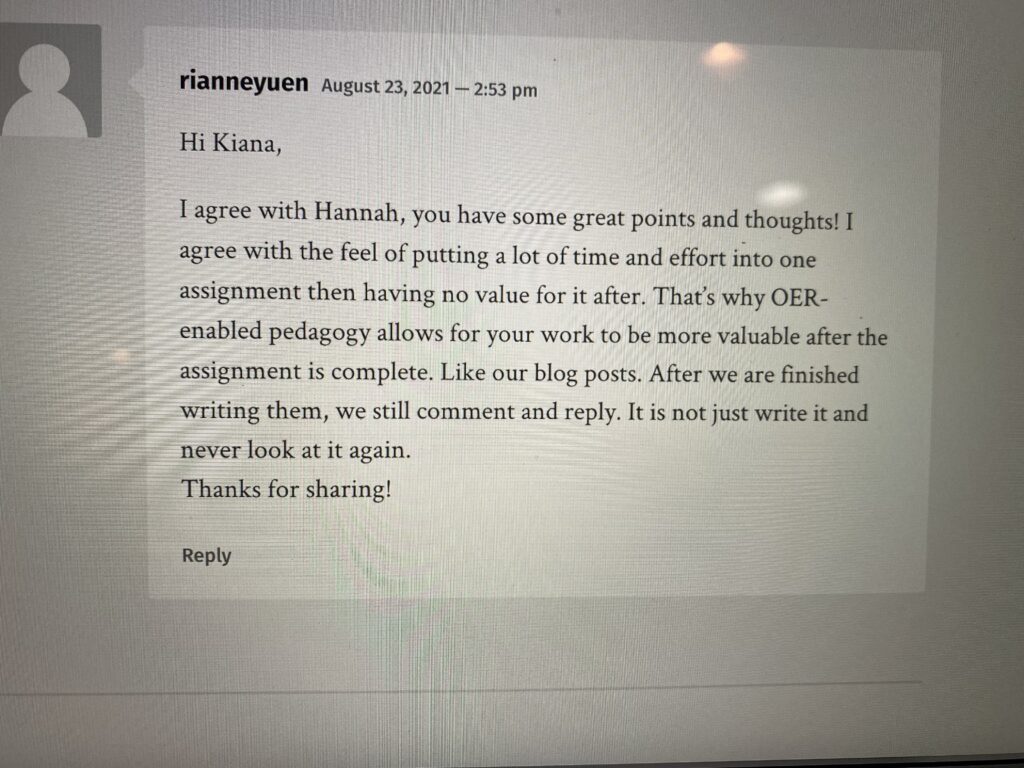Original post
This week, the topic of OER-enabled pedagogy was introduced. I have never heard of this term until now. It is Open Educational Resource- enabled pedagogy which is teaching and learning practices regarding the 5R’s (Retain, reuse, revise, remix and redistribute).Wiley and Hilton (2018) introduce a test to determine OER-enabled pedagogy qualifications. The quick survey is a great way to discover whether ones work can be labelled as OER-enabled pedagogy. At first, the survey did not make sense to me. After re-reading parts of the article I was able to apply it to my own work.
I will use the recent Digital Equity & Perspective Pod project to answer the following questions from Wiley and Hilton’s (2018) OER-enabled pedagogy test.
- Are students asked to create new artifacts (essays, poems, videos, songs, etc.) or revise / remix existing OER?
Yes, my learning pod was asked to create a persona character. We mixed character traits to create this new persona.
- Does the new artifact have value beyond supporting the learning of its author?
Yes. There is valuable information for those in the teaching field. Our projected elaborated on open, diverse and face to face learning. This can guide future teachers on how they would like to teach.
- Are students invited to publicly share their new artifacts or revised / remixed OER?
Yes. We were asked to share our project to our blogs which are public.
- Are students invited to openly license their new artifacts or revised / remixed OER?
Yes. Our blogs are open to the public.
Our pod project is an example of OER-enabled pedagogy. We were able to use other resources to create the project. We used our own learnings from different topics to complete the project. After posting the project to an open blog, others can read and hopefully learn from our ideas and work.
I will re-do the test using a different class. In Indigenous studies 101, we were asked to create a solidarity project and write an essay about it.
- Are students asked to create new artifacts (essays, poems, videos, songs, etc.) or revise / remix existing OER?
Yes, we were asked to find outside resources to explore our own ideas. This was in an essay form.
- Does the new artifact have value beyond supporting the learning of its author?
No. The essay was not shown to anyone but the professor. I learnt a lot from this essay, but no one else will.
- Are students invited to publicly share their new artifacts or revised / remixed OER?
No. I was not asked to share to the public
- Are students invited to openly license their new artifacts or revised / remixed OER?
No. I was not invited to share my findings to an open license site.
Thus, this is not an example of OER-enabled pedagogy. I learned for myself, but I did not teach anyone the information I learned. As mentioned in Kiana’s blog, the feeling of useless work is often embedded in students minds.

One question that crossed my mind is how can teachers incorporate OER-enabled pedagogy into primary school-aged education. Children at a young age should not be on social media or communicating using the internet. However, using OER-enabled pedagogy helps students understand the material better. The student learns about a topic, then has to explain it in a way that teaches someone else. This means the student must understand what he/she learned in order to teach someone else. Thus, the student would master the learning by being able to teach it to someone else. This is a great way for students to learn and test their understanding. With younger children, the teacher could use the same idea with learning then teaching but eliminate the public part. For example, students can simply teach a classmate or the teacher. After the student learns something, he/she can try to teach it to another student who does not know the information. This activity could be in class or with another class (like their Buddies). Overall, there is a way to apply OER-enabled pedagogy to primary aged students.
References
Wiley, D. & Hilton, J. (2018). Defining OER-enabled Pedagogy. International Review of Research in Open and Distance Learning, 19(4).
Leave a Reply